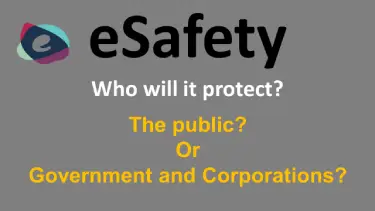Description
Australia’s eSafety laws could silence you online. Learn how they’re shaping online freedoms—and what you can do about it.
Picture This: Your Freedom to Speak Online, Silenced
It’s 7:42 PM. You’ve just posted a thought-provoking comment about government accountability on a public Facebook page. By 8:00 PM, it’s gone—removed under a vague violation of “online safety standards.” You receive no explanation, no warning, just silence. This isn’t fiction—it’s the new reality unfolding under Australia’s expanding eSafety laws.
Behind the promise of protecting citizens from online harm lies a growing apparatus of digital surveillance, opaque authority, and unchecked censorship. But how did we get here, and what can we do to protect our digital rights?
The Problem: When Safety Becomes a Tool for Control
The Rise of eSafety
The eSafety Commissioner, set up in 2015, was initially tasked with protecting Australians—particularly children—from online abuse. It’s a noble goal. However, with each passing year, the scope of power has expanded.
Today, under the Online Safety Act 2021, the eSafety Commissioner can issue take-down notices, block international websites, and require platforms to remove content within 24 hours. Non-compliance can result in massive fines.
Location: Australia’s Digital Landscape in 2024
Australia is now considered a leader in government-regulated online safety—yet critics warn we’re also setting a dangerous precedent. A recent Human Rights Law Centre report described the Online Safety Act as the “most sweeping online regulatory regime in the democratic world.”
Thoughts and Emotions
For activists, journalists, and everyday Australians, this creates an atmosphere of uncertainty. “Can I post this without it being flagged?” “Will my account be suspended for speaking out?” These aren’t paranoid questions—they’re becoming daily considerations for digital citizens.
The Consequences: A Nation of Self-Censorship
Emotional Toll of Uncertainty
Emily, a university student, used to blog about mental health, politics, and feminism. After receiving two warnings from social platforms citing Australia’s safety rules, she stopped posting altogether. “I didn’t want to risk it,” she says. “I felt silenced—like someone was always watching.”
Dialogue from Real People
“It’s like we’re punishing the entire class because one student misbehaved,” said journalist John Stafford. “These laws are meant to curb harm, but they’re curbing democracy.”
Overreach and Opaqueness
Worryingly, the eSafety Commissioner has unilateral power with minimal oversight. Even encrypted communications could be subject to intervention. Critics, including Digital Rights Watch, argue that the laws provide no clear appeals process for removed content or penalised users.
Rebalancing Safety with Freedom
Global Models for Rights-Based Regulation
Germany’s NetzDG law requires transparency and due process. Canada’s approach involves civil society in drafting digital policy. Australia can learn from these by involving citizens, NGOs, and tech experts—not just bureaucrats—in designing online safety frameworks.
Real-World Changes We Need
• Introduce an independent oversight body to review takedown requests.
• Ensure transparency in how decisions are made and enforced.
• Build digital literacy in schools and communities to combat harmful content organically.
• Protect encrypted communication as a right, not a privilege.
A Dollar Sovereignty Approach
 Australia has the monetary sovereignty to fully fund a democratic, transparent, and rights-based digital infrastructure. Public money can be directed toward citizen-led oversight and educational initiatives instead of relying on punitive algorithms.
Australia has the monetary sovereignty to fully fund a democratic, transparent, and rights-based digital infrastructure. Public money can be directed toward citizen-led oversight and educational initiatives instead of relying on punitive algorithms.
Safety Doesn’t Need to Silence
Australia’s eSafety laws were born from good intentions but risk becoming a Trojan horse for censorship. Real safety online comes not from surveillance, but from education, transparency, and respect for civil liberties.
Question for Readers
Have you ever felt silenced or censored online due to vague safety standards? How can we strike a fair balance between safety and freedom?
Q&A Section
Q1: Are eSafety regulations unique to Australia?
A: No, but Australia’s laws are broader in scope and enforced faster than most democratic countries.
Q2: Can I appeal a takedown from the eSafety Commissioner?
A: Technically, the process lacks transparency and a clear path for recourse.
Q3: What can communities do to protect online freedom?
A: Advocate for digital rights, support transparency in lawmaking, and educate citizens about their digital freedoms.
Call to Action
If you found this article about eSafety insightful, explore more on political reform and Australia’s monetary sovereignty at Social Justice Australia. :https://socialjusticeaustralia.com.au/
Share this article with your community to help drive the conversation toward a more just and equal society.
Click on our “Reader Feedback”. Please let us know how our content has inspired you. Submit your testimonial and help shape the conversation today!
Additionally, leave a comment about this article below.
Support Social Justice Australia – Help Keep This Platform Running
Social Justice Australia is committed to delivering independent, in-depth analysis of critical issues affecting Australians. Unlike corporate-backed media, we rely on our readers to sustain this platform.
If you find value in our content, consider making a small donation to help cover the costs of hosting, maintenance, and continued research. No matter how small, every contribution makes a real difference in keeping this site accessible and ad-free.
💡 Your support helps:
✅ Keep this website running without corporate influence
✅ Fund research and publishing of articles that challenge the status quo
✅ Expand awareness of policies that affect everyday Australians
💰 A one-time or monthly donation ensures Social Justice Australia stays a strong, independent voice.
🔗 Donate Now
Thank you for being part of this movement for change. Your support is truly appreciated!
References:
Anti-terror Laws: https://lawcouncil.au/policy-agenda/criminal-law-and-national-security/anti-terror-laws
A Decade of Australian Anti-Terror Laws: https://classic.austlii.edu.au/au/journals/MelbULawRw/2011/38.html
New bill would make Australia the worst in the free world for criminalising journalism: https://theconversation.com/new-bill-would-make-australia-worst-in-the-free-world-for-criminalising-journalism-90840
Opportunism in the Face of Tragedy Repression in the name of anti-terrorism: https://www.hrw.org/legacy/campaigns/september11/opportunismwatch.htm

